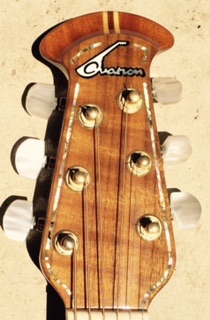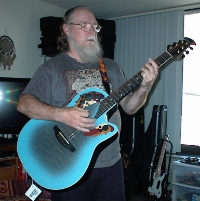|
|
Joined:
October 2006
Posts: 5575
Location: big island | Round Core Guitar Strings History
The theory of round core wires has roots in violin family instruments and piano/harp strings. Those
instruments virtually always use round core wires instead of hex shaped cores. There is a sonic
difference that is 'probably' noticeable to most listeners. I suggest 'probably' because there will
always be some point where other factors overpower the small differences in sound
that hex vs round cores demonstrate.
Typical electric guitar strings, and most steel string acoustic guitar strings use
core wires (for the wound strings) that are HEXAGON in cross section. That is, the wire
is not ROUND but it is hex shaped with six 'corners'. The theory behind the hex shape
core wire is that the mild points or corners of the hex shaped wire 'bites' into the winding
wire which is wrapped around the core. That mild bite helps to lock the winding to the core.
There are some strings, both electric and acoustic, that use ROUND core wires
rather than HEX shape cores. DR strings, Tomastik Infeld (TI) are the two strings
that I am most familiar with that use round core.
Round Core Guitar Strings Construction
Round core wires have more even contact with the windings. Imagine wrapping a piece of
wire around a piece of round pipe. The wire, like the windings on guitar strings,
contacts the pipe with equal pressure throughout the entire circumference of the pipe.
Now imagine wrapping a piece of wire around a rectangular piece of lumber, like a 2 x 4.
The wrapped wire will 'dig in' to the square corners of the lumber. The wrapped wire
contacts the 'flat' sides of the lumber with a lot less pressure.
Imagine the same thing happening with guitar strings. The outer windings, when wrapped
around a hex shaped core, will contact the 'points' with more pressure than when they
contact the 'flats'. But do the same thing on a round core wire and the contact pressure will be
equal everywhere winding meets the core.
Tomastik Infeld, The Austrian string manufacturer, takes this process one step further.
They wrap the round core with not ONE but TWO layers of winding wire.
That results in a more flexible string, with less overall tension.
More evenly distributed pressure in the windings typically results in:
1 - Lower overall tension
Round core strings have lower tension than hex core strings. The perceived 'work'
required to fret the strings is less with round core strings. If your fretting hand is bothered
a bit by what you perceive as a lot of string tension, switching from hex cores
to round cores will reduce that tension a bit.
2 - More sustain
Because all of the stresses of core to windings are more equally distributed, round core strings
can use more of their physical energy to produce SOUND. Hex core strings produce
more friction between the core and the winding. That means that some of the physical
movement of the string is wasted in producing HEAT instead of SOUND.
3 - Even Harmonic Overtones
Like the difference in tube vs solid state amplifiers, round core wires emphasize the
even or 'sweet sounding' harmonic overtones. This characteristic will be a little harder to
sense than the other two above. But we can measure it on a spectrograph. The resulting
tone is a little more 'bell like'. Consider that orchestral bells are made of tubular material.
Vibraphone bars are made of rectangular material. A subtle but noticeable difference.
Installing Round Core Strings
DR suggests, when you install these roundcores, be sure you have a wrap or two around the
tuning post before you cut off the excess length. The reasoning is that since the core is not
hex shaped, the windings are not locked to the core except at the distal crimp. I've
deliberately cut them at the windings to see if they seem to unravel. I can't measure any
increased diameter that suggests they are unwinding and I don't see any changes under
visual magnification. But it's probably worth considering doing. I install them the way DR
suggests, not cutting them until I've got them locked to the tuner posts, just to be safe.
(this article was copied from a link i found on eBay) | |
| | |
Joined:
April 2006
Posts: 2491
Location: Copenhagen Denmark | Yes,all very True,they forgot to mention that Choice of Material is Equally Important (to Tone)the Dual-Coil winding is Interesting,it Gives a Very Complex "fingerprint" to Tone,Very Nice,specially in note-for-note playing,and recommendable for guitars that have a "dry" or "tiddy" bass,could be Beneficial for a small box (like the shallow bowl),on a bigger box it adds "depth" to sound( fx dread) ,unfortunately ,they wear rather quick,causing a rumblin`rattle..
Vic
..Mahalo.. | |
| | |
Joined:
October 2006
Posts: 5575
Location: big island | vic,
i enjoy your posts but think you should use the space bar more often. no, not the pub from the jetson's, the one on your keyboard! | |
| | |
Joined:
April 2006
Posts: 2491
Location: Copenhagen Denmark | Randi,
Space eh,I`ve stopped smokin`that a long time ago,now I use these ,,,,,,,instead :)
Vic
...andtheonlyacidIenjoyisthatinmycoffee.. | |
| | |

Joined:
January 2002
Posts: 14127
Location: 6 String Ranch | A wonderful bunch of rhetoric, and the majority of it all being true.
Now the best strings are still the ones you can get for free.(or as close to that as you can get) | |
| | |
Joined:
February 2002
Posts: 5750
Location: Scotland | Free or less than 2 bucks a set wholesale, then it doesn't matter if the they're hex core or round core, or what the name is on the pack. With my body chemistry they're never on long enough for me to care. My last free strings deal is just about done, I need to work on another. | |
| | |
Joined:
March 2002
Posts: 15679
Location: SoCal | Nah, Beal's wrong. The best strings are the one's that last the longest with good tone. I'll pay serious money not to have to change strings real often.... | |
| | |
Joined:
April 2006
Posts: 2491
Location: Copenhagen Denmark | Originally posted by moody, p.i.:
Nah, Beal's wrong. The best strings are the one's that last the longest with good tone. I'll pay serious money not to have to change strings real often.... That prompts the question :
Have you tried them cryogenics (blue steels).. them should last longer, without the plastic hose , like other brands resort to..if you have, how do they compare..??
Vic
..I´m rather curious ..but.. :) | |
| | |
Joined:
September 2003
Posts: 782
Location: Waurika OK | Then, of course, we must also consider the effect of string tubes. | |
| | |

Joined:
September 2006
Posts: 10777
Location: Keepin' It Weird in Portland, OR | Originally posted by xnoel:
Then, of course, we must also consider the effect of string tubes. I knew That was coming! | |
| |
|
 round core vs. hex core strings article
round core vs. hex core strings article round core vs. hex core strings article
round core vs. hex core strings article